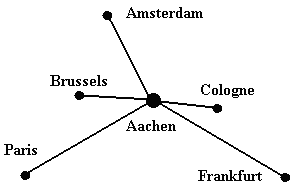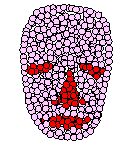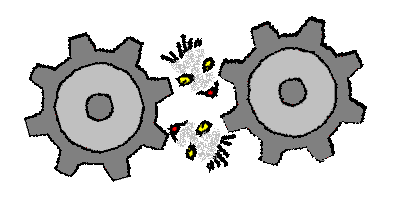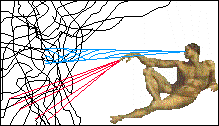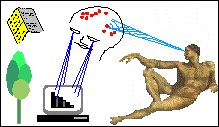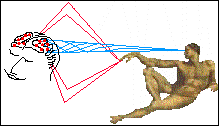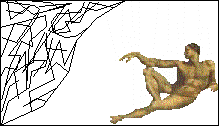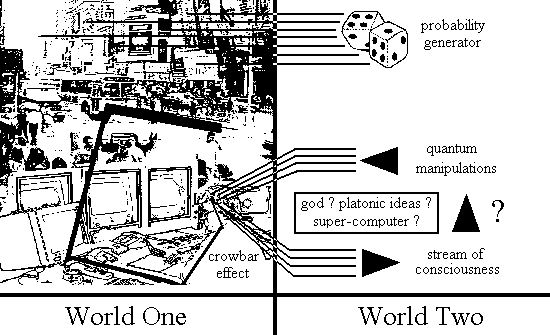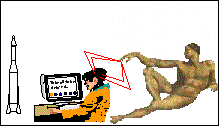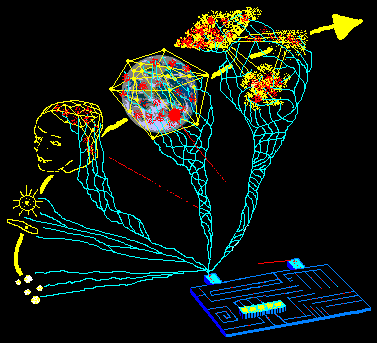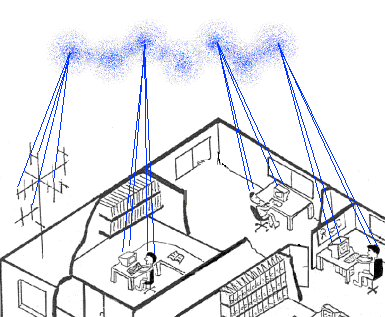The Cosmic Meaning of our Lives |
||
There should be a meaning to life I am an ordinary person living near the German town of Aachen right at the Belgian and Dutch border.
|
|
|
| I work as a mining engineer at Aachen Technical University. Eight hours a day, I spend in front of a computer monitor, helping to develop software applications for the German coal industry. |  Museums and
pictures about mining and the City of Aachen Museums and
pictures about mining and the City of Aachen |
|
On the whole, I am healthy and there is no shortage of material things. I can afford to eat and live well and I enjoy going out with friends every now and then. I have no reason to complain about anything (and I don`t). |
||
Yet, I am not fully happy. There is a persistent desire to be part of something bigger than myself, an urge to contribute to a higher end. This desire can be traced back to childhood. I remember well that I was no older than seven or eight, when I began to wonder about cosmic issues like the notion of infinity, the paradox of God being almighty and benevolent at the same time and the very meaning of life itself. It is interesting to note, that many children at that age ask the same question. The answers they usually get from grown-ups, however, are hardly encouraging. |
||
So some people dismiss these questions as irrelevant to practical life. Others, however, never stop asking them and they may be termed philosophers in the true meaning of the word: lovers of knowledge. |
||
I certainly
belong to these and I am one of many. Esoteric literature
about Eastern philosophies, angels and healing stones can
be found in almost any bookshop in Aachen. There are many
courses at Aachen Technical University, at the local
Volkshochschule (sort of Open University) and by various
other institutions ranging from down-to-earth studies of
the ancient Greeks to New Age Mysticism. I am doing some
courses at Aachen University and it is surprising to see
see that philosophy courses are more freqeunted by old
age pensioners than proper students. This seems to
reflect a strong need by many people for a larger meaning
of life. There is no economic benefit to be derived from
learning about plato's ideas or discussing the
ontological aspects of super-string theory. |
||
A Child`s Cosmos In a religious sense, my childhood was quite uneventful. The relatives with whom I had most contact were neither militant atheists nor did they practice much missionary zest. The common customs of Christian belief, however, were woven into everyday life in a matter-of-fact way. At the age of about 5, I automatically said my evening prayer before I went to sleep. Memories of Christmas Day are still strongly attached to the small church in my native town and the singing of Christian hymns. When I conjure up my grandma`s and grand-aunt`s houses in my mind`s eye, I invariably recall paintings of Jesus, Holy Mary and other religious motives. And I went to Sunday School more or less regularly, hearing about Jona and the whale, the travels of St. Paul, how Jesus could walk on water and heal the crippled. |
||
| God I always imagined as the
old wise man with the long white beard. He was sitting
somewhere up in heaven on a feathery cloud. He had a book
made of stone on his lap and there were angels of both
genders clad in white garments and with golden hair
attending him. |
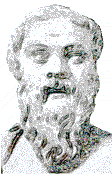 This picture of Sokrates comes
very close to my childhood God. This picture of Sokrates comes
very close to my childhood God. |
|
Disillusionment When I was 20 years old, atheism was just as self-evident and plain a fact to me as the existence of my bearded childhood God had been 15 years before. Disillusionment had been a slow step-by-step process. It was the classical way science was taught at school which had finally destroyed my god. In biology, chemistry, physics and maths the principle of causality had never been explicitly questioned or asserted. There was no need to even disucss it. The main effect of science at school was to rub in this law by constant demonstration of its validity:
At the time, I did not experience any bereavement. Instead, I regarded science as something higher than god. Religion, I was sure, was only for the uneducated, the nostalgic and the victims of terrible fates. I took the pleasure of someone who has found the right creed in applying this deterministic view of the world to all my thinkings. It is one thought-experiment that I remember particularly well. I was 16 or 17 when I first had contact with computers. That was in 1982 or 1983. I was sitting in front of my 1 Kilobyte ZX81 Basic computer. It suddenly occured to me that I myself may be nothing else but a brain immersed in some liquid in a bowl, attached to a large computer simulating all this world around me. Today, this thought fills me with horror. Then, it gave me the thrill of conquering new intellectual worlds. |
||
| I enjoyed reading Nietzsche
because he was said do have "destroyed" God. I
was intrigued by the writings of Konrad Lorenz and Niko
Tinbergen who had carried out research into animal
behaviour during the 20th century. Without hesitation I
transferred their findings to humans. Books with titles
like "Reactions of the Human Machine" gave me a
strong and immediate delight in being on the right way.
And from the teachings of Buddha I distilled all
allusions to the renunciation of personal will. As there
was no point in life anyway, I thought, the nearest one
can get to happiness is complete self-denial. At the age of about 20, I had completely driven God and even the idea of personal indivuality out of my world. |
||
Resurgence I don`t know anymore whether it was pure intellectual playfulness or an underlying but persistent need to seek something more lofty than soulless materialism, but in about 1987, I began to ask myself under what conditions could God be allowed back into my personal cosmos. I never thought of questioning the methods and the validity of science. So God's interference with our world had to take place in a way as not to collide with the laws of science. |
||
| I began to suspect all
phenomena that were either not needed in a scientific
view of the world or that did not interfere with it of
being potentially indicative of some divine volition. I
began to read about Buddha`s lore, medieval mysticism as
expressed by the German "Meister Eckehart" and
experiences induced by drugs as described by Aldous
Huxley and Carlos Castaneda. It was the existence of consciousness and some mental states of religious or rather cosmic feeling that puzzled me as superfluous to a mechanistic cosmos and for this very reason, they promised to be a good scent on the trail out of mechanistic nihilism. |
||
| I remember distinctly that I
was searching for some higher end at that time. But all
my intelligence and all my knowledge had been trained to
falsify or at least effectively question all philosophies
and religions. This was still in the days of the Cold War
between the Communist East and the West. Sometimes I lay in bed at night with aggressively nihilistic thoughts in my head. I imagined intercontinental missiles carrying nuclear warheads to devastate the planet. I experienced some sort of "Weltschmerz" (World-pain) and I knew not whether I should pride myself on having understood the inescapable futility of everything or whether I should rather deplore this state of things and seek an alternative. It was the latter impulse which was to gain in strength over the following years. |
||
Quantum Physics: A New Outlook Until the start of my studies at Aachen University in 1990, I had not had contact with the natural sciences ever since leaving school in 1986. I had, however, read many books covering a wide range of philsophy and religion. So, I had come across the word "quantum physics" rather often. It was usually mentioned with reference to its mysterious character, the existence of true chance happenings and the fundamental question of what matter and the laws of physics are really like (today, I would use the word ontological). I began to read about it and soon I wondered why we had not been told about its implications at school. Strangely enough, even in physics and chemistry at university it was only mentioned as something needed to determine the location of electrons around an atomic nucleus. Yet, I was soon convinced that quantum happenings may be ruled by truly statistical laws. Each happening for itself may be quite undetermined. Here at last there was a piece of physical reality God could interfere with without having to cause a miracle. Small particles or lumps of energy the size of electrons or photons jump through space and time - so to speak - and no deterministic law seems to govern where they go. Only large numbers of these particles must obey certain probabilities. If an electron under a certain condition has a 89% chance of turning up on a certain spot in the next moment it may as well turn up somewhere quite different. |
|
|
Pieces Falling into Place The problem with quantum physics is that the particles that could possibly be influenced by God were less than minute. It is hard to imagine that God could effectively influence people or other physical objects in our reality by meddling with submicroscopic quantum events. But this problem was solved by two other ideas that were very active in my head at that time: |
||
Putting these two thoughts together with the probabilistic and non-deterministic nature of quantum mechanics and with the wish to have a God I came up with the following conglomerate of hypotheses: |
||
|
||
|
|
|
|
|
|
|
|
|
|
A dualistic view of the world |
||
| The picture above sums up
this dualistic view of the world. World One is our
physical reality. It so to speaks transmits reports,
images, feelings etc. to the other world, world
2. This we experience as a the stream of consciousness.
In World Two this information is somehow interpreted by
someone or something in order to influence some quantum
events in World One. By focusing on particularly effective structures of this world, the "whatever" of World Two can make use of a crowbar effect. The example above shows the operator of a traffic control system in a large city. By judiciously influencing some quantum effects in the operator's brain, it is possible to divert whole streams of traffic and thereby the course of history to some extent. This is what I call the crowbar effect; some sort of leverage. All other quantum events are controlled by some sort of probability generator. The volition (god, computer, ideas...) of world two only concerns itself with specifically useful quantum events. This view of the world can account for some phenomena that had seemed unrelated to me before: |
metaphorical picture: the world-process metaphorical picture: the universe as a computer animation
|
|
|
||
This is what I still believe today as the most likely hypothesis to explain the world in a holistic way. |
||
A Community of Searchers During the seond half of the 1990ies, a large number of books was issued on many different topics broached above. Especially books and articles about the implications of quantum physics and research activities into the nature of consciousness seemed to sell well. It dawned on me that cosmology, quantum physics, neurology and natural history had been the field of philosophical studies for a very long time. Computer sciences and the theory of complexity added rich stimuli and there seemed to be a large world community busily trying to merge scientific results from many different disciplines into cosmic or even tentatively religious interpretations. As it is the intention of this website to make contact with other people of similar interest, I would like to name some of the authors and books I have read over the past years. The books one reads often reveal more about a person than abstract words: |
||
Mysticism, Fiction,
Spirituality
Quantum Physics and Consciousness
|
|
|
Evolution of Complexity
& Basic Priniciples of Intelligence
These books reflect my interests very well. |
|
|
Wish for Contact My way of life, my choice of career and above all my lack of love of detail prevent me from pursuing these ideas in a scientifically acceptable way. But I feel a strong desire to discuss such topics with other people. To this purpose I started taking philosophy courses at Aachen University in 2000. I do this together with two colleagues and we have already met a few people who share our interests. |
||
Current Interests At present, I am particularly interested in the
following topics and questions:
I am grateful for suggestions of books, websites or critical comments. |
||
